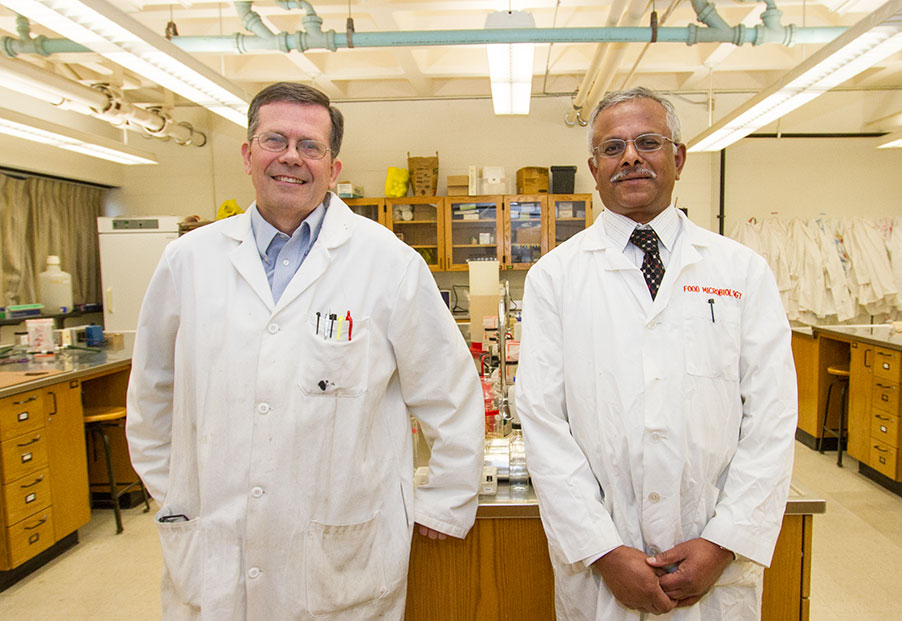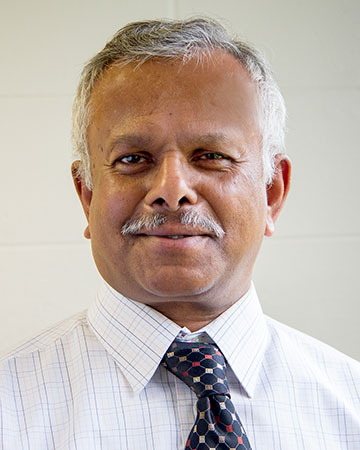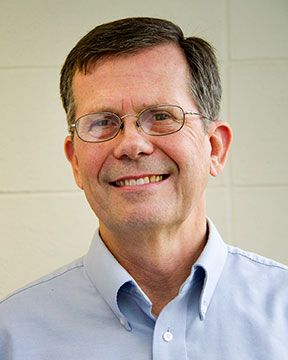Posted 1:09 p.m. Friday, May 2, 2014

This spring Mike Winfrey and S.N. Rajagopal will retire after a combined 61 years working for their department.
 Microbiology Professors from left, Mike Winfrey and S.N. Rajagopal will retire at the end of the academic year. They have a combined 61 years working for the department and building it into the strong program it is today.[/caption]
A few years ago, UW-L student Amy Baker was accidentally placed in Microbiology 100. It wasn’t the course the education major had selected.
“I was so angry and confused — thinking I don’t even know what this means — micro-biology — what are you talking about?,” she recalls.
But the mishap ended up in Baker changing her major to microbiology.
Today the UW-L senior plans to continue on in UW-L’s microbiology graduate school program. The reason she dramatically changed her plans?
“Without a doubt — the faculty in the department. There is so much passion here,” she says. “They really care about their students.”
This spring, two of those faculty members will retire after a combined 61 years working for the department. Both Mike Winfrey and S.N. Rajagopal have been the primary forces in building the microbiology department. Winfrey was the program’s director in 1997 and became the first chair of the microbiology department when it split off from biology in 1999. Rajagopal is the department’s food and industrial microbiologist, an area where most of the department’s students find careers.
Microbiology Professors from left, Mike Winfrey and S.N. Rajagopal will retire at the end of the academic year. They have a combined 61 years working for the department and building it into the strong program it is today.[/caption]
A few years ago, UW-L student Amy Baker was accidentally placed in Microbiology 100. It wasn’t the course the education major had selected.
“I was so angry and confused — thinking I don’t even know what this means — micro-biology — what are you talking about?,” she recalls.
But the mishap ended up in Baker changing her major to microbiology.
Today the UW-L senior plans to continue on in UW-L’s microbiology graduate school program. The reason she dramatically changed her plans?
“Without a doubt — the faculty in the department. There is so much passion here,” she says. “They really care about their students.”
This spring, two of those faculty members will retire after a combined 61 years working for the department. Both Mike Winfrey and S.N. Rajagopal have been the primary forces in building the microbiology department. Winfrey was the program’s director in 1997 and became the first chair of the microbiology department when it split off from biology in 1999. Rajagopal is the department’s food and industrial microbiologist, an area where most of the department’s students find careers.
S.N. Rajagopal: The food microbiologist
Rajagopal started at UW-L 28 years ago to develop Food and Industrial Microbiology within the program. One of his most significant achievements was the start of the Symposium on Industrial and Fermentation Microbiology 18 years ago. The symposium allows students to connect with people practicing industrial and fermentation microbiology in industry from all over the world, such as biofuels, dairy, antibiotics, bread, beer, waste treatment, water purification and more. [caption id="attachment_33829" align="alignleft" width="288"] S.N. Rajagopal[/caption]
“He (Rajagopal) has provided essential breadth to our department, has a connection with industry and gotten a lot of our students jobs,” says Bonnie Jo Bratina, associate professor of microbiology.
Very few universities have programs similar to UW-L where the students get first-hand exposure to industrial fermentation concepts, says Chris Stowers, with Dow AgroSciences, part of The Dow Chemical Company.
Stowers was among the speakers at the April 25 symposium. He traveled from Indianapolis because it was an opportunity to network with academia and other experts.
“It (academia) is typically working on the cutting-edge, high-risk technology,” says Stowers. “It’s important for me, in industry, to keep a tab on that.”
He also finds it a great way to network with potential future employees.
“It is clear students wanted to be here,” says Stowers. “They are very engaged. It can be hard to find students enthusiastic about this particular field.”
Bob Schwartz, from Chicago, started attending the symposium before it was a formal gathering. He continues to return because he likes sharing his career in dairy fermentation with students. “I was trying to communicate the fun in my career and that you can be successful in areas of industrial fermentation,” says Schwartz, who is now retired.
Pam Benzing, lab manager in microbiology at UW-L, says Rajagopal has put extraordinary effort into finding great speakers who make the symposium an event everyone wants to attend.
Baker and UW-L Senior Margaux Huismann — who changed her major from pre-nursing to microbiology — say the symposium has shown them how much they’ve learned. When they started in the program, they attended many scientific talks that they didn’t comprehend.
“The thing about today,” explains Huismann, “I knew everything they were talking about and I wasn’t confused once.”
Speakers touched on concepts she and Baker already knew from organic chemistry, bacterial physiology, biochemistry and food microbiology.
“It makes you realize all that you are learning,” says Baker.
Benzing, who was also a student in the microbiology graduate school program in the late 1990s, says Rajagopal expects a lot from his students, but offers them a lot in return.
“He is our biggest cheerleader,” says Huismann. “He says we are more qualified than we think we are because the microbiology program here is one of the best.”
After UW-L, Rajagopal plans to work for a cheese company and do research on bacterial cultures used in cheese making.
S.N. Rajagopal[/caption]
“He (Rajagopal) has provided essential breadth to our department, has a connection with industry and gotten a lot of our students jobs,” says Bonnie Jo Bratina, associate professor of microbiology.
Very few universities have programs similar to UW-L where the students get first-hand exposure to industrial fermentation concepts, says Chris Stowers, with Dow AgroSciences, part of The Dow Chemical Company.
Stowers was among the speakers at the April 25 symposium. He traveled from Indianapolis because it was an opportunity to network with academia and other experts.
“It (academia) is typically working on the cutting-edge, high-risk technology,” says Stowers. “It’s important for me, in industry, to keep a tab on that.”
He also finds it a great way to network with potential future employees.
“It is clear students wanted to be here,” says Stowers. “They are very engaged. It can be hard to find students enthusiastic about this particular field.”
Bob Schwartz, from Chicago, started attending the symposium before it was a formal gathering. He continues to return because he likes sharing his career in dairy fermentation with students. “I was trying to communicate the fun in my career and that you can be successful in areas of industrial fermentation,” says Schwartz, who is now retired.
Pam Benzing, lab manager in microbiology at UW-L, says Rajagopal has put extraordinary effort into finding great speakers who make the symposium an event everyone wants to attend.
Baker and UW-L Senior Margaux Huismann — who changed her major from pre-nursing to microbiology — say the symposium has shown them how much they’ve learned. When they started in the program, they attended many scientific talks that they didn’t comprehend.
“The thing about today,” explains Huismann, “I knew everything they were talking about and I wasn’t confused once.”
Speakers touched on concepts she and Baker already knew from organic chemistry, bacterial physiology, biochemistry and food microbiology.
“It makes you realize all that you are learning,” says Baker.
Benzing, who was also a student in the microbiology graduate school program in the late 1990s, says Rajagopal expects a lot from his students, but offers them a lot in return.
“He is our biggest cheerleader,” says Huismann. “He says we are more qualified than we think we are because the microbiology program here is one of the best.”
After UW-L, Rajagopal plans to work for a cheese company and do research on bacterial cultures used in cheese making.
Mike Winfrey: UW-L’s microbiology beginning
[caption id="attachment_33834" align="alignright" width="288"] Mike Winfrey[/caption]
Mike Winfrey was hired in 1981 to help expand the microbiology program at UW-L. At that time, he was one of three microbiologists and Microbiology was a concentration in the biology major.
Winfrey was hired to teach advanced bacteriology, but subsequently divided this course into bacterial physiology and microbial genetics and developed new courses in bacterial diversity and aquatic microbial ecology.
Winfrey became the microbiology program director in 1997 and was the first chair when the Department of Microbiology was formed in 1999.
“He did a lot to guide us through the baby steps of becoming a department,” notes Bratina.
He was also an early and significant contributor to UW-L mercury research starting in the 1980s, long before the mercury toxicity problem was well documented. Today UW-L mercury research has expanded from nearby rivers to bodies of water across the United States and involves international collaborations.
Winfrey and his graduate students found that the mercury-methylating activity of bacteria in bottom sediments greatly affected the concentrations of methylmercury accumulating in aquatic food webs and fish, says Jim Wiener, Wisconsin Distinguished Professor, in UW-L’s River Studies Center.
“Their published papers from those landmark studies continue to be widely cited more than two decades later,” he says.
An article by Winfrey and his Canadian coauthor John Rudd was published in one of the world’s leading environmental science journals, “Environmental Toxicology and Chemistry.” The article, which reviewed years of mercury research as well as new findings, was ranked No. 24 on the Top 100 list of the most highly-cited environmental impact papers in the journal’s 30-year history.
In 1991 Winfrey, along with faculty Al Wortman and Marc Rott, began offering National Science Foundation funded summer laboratory workshops in molecular biology for college faculty from across the U.S. and Puerto Rico. The lab exercises were based on the exercises developed for the microbial genetics course. Over five years 100 faculty were trained in modern molecular biology techniques.
The course was so popular that Winfrey, Wortman, and Rott published the exercises in a molecular biology laboratory manual. It is now one of the most popular molecular biology laboratory manuals in the U.S.
Bratina was hired “to be another Mike Winfrey,” she jokes, noting she is also an environmental microbiologist.
“I came in here thinking I knew physiology, but, after sitting through his lab, I learned a lot more physiology from him,” she says. “He has been an amazing mentor.”
Winfrey makes topics as complex as bacterial physiology comprehensible and sometimes even humorous, his students say. He does demonstrations a lot, they note, recalling one where he threw a marker into the classroom from outside the door to demonstrate proton gradients.
“He lightens the mood — right when you least expect it,” says Baker.
Mike Winfrey[/caption]
Mike Winfrey was hired in 1981 to help expand the microbiology program at UW-L. At that time, he was one of three microbiologists and Microbiology was a concentration in the biology major.
Winfrey was hired to teach advanced bacteriology, but subsequently divided this course into bacterial physiology and microbial genetics and developed new courses in bacterial diversity and aquatic microbial ecology.
Winfrey became the microbiology program director in 1997 and was the first chair when the Department of Microbiology was formed in 1999.
“He did a lot to guide us through the baby steps of becoming a department,” notes Bratina.
He was also an early and significant contributor to UW-L mercury research starting in the 1980s, long before the mercury toxicity problem was well documented. Today UW-L mercury research has expanded from nearby rivers to bodies of water across the United States and involves international collaborations.
Winfrey and his graduate students found that the mercury-methylating activity of bacteria in bottom sediments greatly affected the concentrations of methylmercury accumulating in aquatic food webs and fish, says Jim Wiener, Wisconsin Distinguished Professor, in UW-L’s River Studies Center.
“Their published papers from those landmark studies continue to be widely cited more than two decades later,” he says.
An article by Winfrey and his Canadian coauthor John Rudd was published in one of the world’s leading environmental science journals, “Environmental Toxicology and Chemistry.” The article, which reviewed years of mercury research as well as new findings, was ranked No. 24 on the Top 100 list of the most highly-cited environmental impact papers in the journal’s 30-year history.
In 1991 Winfrey, along with faculty Al Wortman and Marc Rott, began offering National Science Foundation funded summer laboratory workshops in molecular biology for college faculty from across the U.S. and Puerto Rico. The lab exercises were based on the exercises developed for the microbial genetics course. Over five years 100 faculty were trained in modern molecular biology techniques.
The course was so popular that Winfrey, Wortman, and Rott published the exercises in a molecular biology laboratory manual. It is now one of the most popular molecular biology laboratory manuals in the U.S.
Bratina was hired “to be another Mike Winfrey,” she jokes, noting she is also an environmental microbiologist.
“I came in here thinking I knew physiology, but, after sitting through his lab, I learned a lot more physiology from him,” she says. “He has been an amazing mentor.”
Winfrey makes topics as complex as bacterial physiology comprehensible and sometimes even humorous, his students say. He does demonstrations a lot, they note, recalling one where he threw a marker into the classroom from outside the door to demonstrate proton gradients.
“He lightens the mood — right when you least expect it,” says Baker.